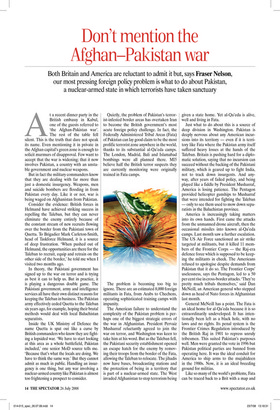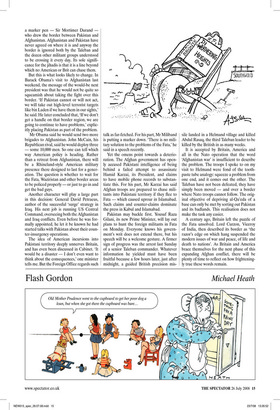Don’t mention the Afghan–Pakistan war
Both Britain and America are reluctant to admit it but, says Fraser Nelson, our most pressing foreign policy problem is what to do about Pakistan, a nuclear-armed state in which terrorists have taken sanctuary At a recent dinner party in the British embassy in Kabul, one of the guests referred to ‘the Afghan-Pakistan war’. The rest of the table fell silent. This is the truth that dare not speak its name. Even mentioning it in private in the Afghan capital’s green zone is enough to solicit murmurs of disapproval. Few want to accept that the war is widening; that it now involves Pakistan, a country with an unstable government and nuclear weapons.
But in fact the military commanders know that they are dealing with far more than just a domestic insurgency. Weapons, men and suicide bombers are flooding in from Pakistan every day. Like it or not, war is being waged on Afghanistan from Pakistan.
Consider the evidence: British forces in Helmand have achieved striking success in repelling the Taleban, but they can never eliminate the enemy entirely because of the constant stream of new recruits flowing over the border from the Pakistani town of Quetta. To Brigadier Mark Carleton-Smith, head of Taskforce Helmand, it is a source of deep frustration. ‘When pushed out of Helmand, the opportunities are there for the Taleban to recruit, equip and retrain on the other side of the border,’ he told me when I visited two months ago.
In theory, the Pakistani government has signed up to the war on terror and is trying as best it can to help us. But in practice, it is playing a dangerous double game. The Pakistani government, army and intelligence services all have their own distinct reasons for keeping the Taleban in business. The Pakistan army effectively ceded Quetta to the Taleban six years ago, for example, hoping their brutal methods would deal with local Baluchistan separatists.
Inside the UK Ministry of Defence the name Quetta is spat out like a curse by British commanders who know they are fighting a lopsided war. ‘We have to start looking at this area as a whole battlefield, Pakistan included,’ one senior MoD source tells me. ‘Because that’s what the locals are doing. We have to think the same way.’ But they cannot admit as much in public. Handling an insurgency is one thing, but any war involving a nuclear-armed country like Pakistan is almost too frightening a prospect to consider. Quietly, the problem of Pakistan’s terrorist-infested border areas has overtaken Iran to become the British government’s most acute foreign policy challenge. In fact, the Federally Administered Tribal Areas (Fata) of Pakistan can lay good claim to be the most prolific terrorist zone anywhere in the world, thanks to its substantial al-Qa’eda camps. The London, Madrid, Bali and Islamabad bombings were all planned there. MI5 believe half the British terror suspects they are currently monitoring were originally trained in Fata camps.
The problem is becoming too big to ignore. There are an estimated 8,000 foreign militants in Fata, from Arabs to Chechens, operating sophisticated training camps with impunity.
The American failure to understand the complexity of the Pakistan problem is perhaps one of the biggest strategic errors of the war in Afghanistan. President Pervaiz Musharraf reluctantly agreed to join the war on terror, and Washington was keen to take him at his word. But as the Taleban fell, the Pakistani security establishment opened an escape hatch for the enemy by removing their troops from the border of the Fata, allowing the Taleban to relocate. The jihadis now have bases, broadcasting stations and the protection of being in a territory that is part of a nuclear-armed state. The West invaded Afghanistan to stop terrorism being given a state home. Yet al-Qa’eda is alive, well and living in Fata.
Just what to do about this is a source of deep division in Washington. Pakistan is deeply nervous about any American incursions into its territory — even if it is territory like Fata where the Pakistan army itself suffered heavy losses at the hands of the Taleban. Britain is pushing hard for a diplomatic solution, saying that no incursion can succeed without the backing of the Pakistani military, which is geared up to fight India, not to track down insurgents. And anyway, after years of failed policy, and being played like a fiddle by President Musharraf, America is losing patience. The Pentagon provided helicopter gunships to Musharraf that were intended for fighting the Taleban — only to see them used to mow down separatists in the Baluchistan province.
America is increasingly taking matters into its own hands. First came the attacks from the unmanned drone aircraft, then the occasional missiles into known al-Qa’eda camps. Last month saw a further escalation. The US Air Force sanctioned an air strike targeted at militants, but it killed 11 members of the Frontier Corps — the Raj-era defence force which is supposed to be keeping the militants in check. The Americans refused to apologise despite demands from Pakistan that it do so. The Frontier Corps’ uselessness, says the Pentagon, led to a 50 per cent rise in cross-border attacks. ‘They’re pretty much tribals themselves,’ said Dan McNeill, an American general who stepped down as head of Nato forces in Afghanistan last month.
General McNeill has a point. The Fata is an ideal home for al-Qa’eda because it is so extraordinarily undeveloped. It has intentionally been left as a black hole, with no laws and no rights. Its penal system is the Frontier Crimes Regulation introduced by the British Raj in 1901 to repress unruly tribesmen. This suited Pakistan’s purposes well. Men were granted the vote in 1996 but Pakistan political parties are banned from operating here. It was the ideal conduit for America to ship arms to the mujahideen in the 1980s. Now, it is an ideal breeding ground for militias.
Like so many of the world’s problems, Fata can be traced back to a Brit with a map and a marker pen — Sir Mortimer Durand — who drew the border between Pakistan and Afghanistan. Afghanistan and Pakistan have never agreed on where it is and anyway the border is ignored both by the Taleban and the dozen other militant groups understood to be crossing it every day. Its sole significance for the jihadis is that it is a line beyond which no American or Brit can chase them.
But this is what looks likely to change. In Barack Obama’s visit to Afghanistan last weekend, the message of the would-be next president was that he would not be quite so squeamish about taking the fight over this border. ‘If Pakistan cannot or will not act, we will take out high-level terrorist targets like bin Laden if we have them in our sights,’ he said. He later concluded that, ‘If we don’t get a handle on that border region, we are going to continue to have problems,’ explicitly placing Pakistan as part of the problem.
Mr Obama said he would send two more brigades to Afghanistan. John McCain, his Republican rival, said he would deploy three — some 10,000 men. So one can tell which way American policy is heading. Rather than a retreat from Afghanistan, there will be a Rhineland-style American military presence there designed to last for a generation. The question is whether to wait for the Fata, Waziristan and other border areas to be policed properly — or just to go in and get the bad guys.
Another character will play a large part in this decision: General David Petraeus, author of the successful ‘surge’ strategy in Iraq. His next job is running US Central Command, overseeing both the Afghanistan and Iraq conflicts. Even before he was formally appointed, he let it be known he had started talks with Pakistan about their counter-insurgency operations.
The idea of American incursions into Pakistani territory deeply unnerves Britain, and has even been discussed in Cabinet. ‘It would be a disaster — I don’t even want to think about the consequences,’ one minister tells me. But the Foreign Office regards such talk as far-fetched. For his part, Mr Miliband is putting a marker down. ‘There is no military solution to the problems of the Fata,’ he said in a speech recently.
Yet the omens point towards a deterioration. The Afghan government has openly accused Pakistani intelligence of being behind a failed attempt to assassinate Hamid Karzai, its President, and claims to have mobile phone records to substantiate this. For his part, Mr Karzai has said Afghan troops are prepared to chase militants into Pakistani territory if they flee to Fata — which caused uproar in Islamabad. Such claims and counter-claims dominate the press in Kabul and Islamabad.
Pakistan may buckle first. Yousuf Raza Gilani, its new Prime Minister, will lay out plans to hunt the foreign militants in Fata on Monday. Everyone knows his government’s writ does not extend there, but his speech will be a welcome gesture. A firmer sign of progress was the arrest last Sunday of a senior Taleban commander. Whatever information he yielded must have been fruitful because a few hours later, just after midnight, a guided British precision mis sile landed in a Helmand village and killed Abdul Rasaq, the third Taleban leader to be killed by the British in as many weeks.
It is accepted by Britain, America and all in the Nato operation that the word ‘Afghanistan war’ is insufficient to describe the problem. The troops I spoke to on my visit to Helmand were fond of the toothpaste tube analogy: squeeze a problem from one end, and it comes out the other. The Taleban have not been defeated, they have simply been moved — and over a border where Nato troops cannot follow. The original objective of depriving al-Qa’eda of a base can only be met by sorting out Pakistan and its badlands. This realisation does not make the task any easier.
A century ago, Britain left the puzzle of the Fata unsolved. Lord Curzon, Viceroy of India, then described its border as ‘the razor’s edge on which hang suspended the modern issues of war and peace, of life and death to nations’. As Britain and America brace themselves for the next phase of this expanding Afghan conflict, there will be plenty of time to reflect on how frighteningly true these words remain.



























































 Previous page
Previous page